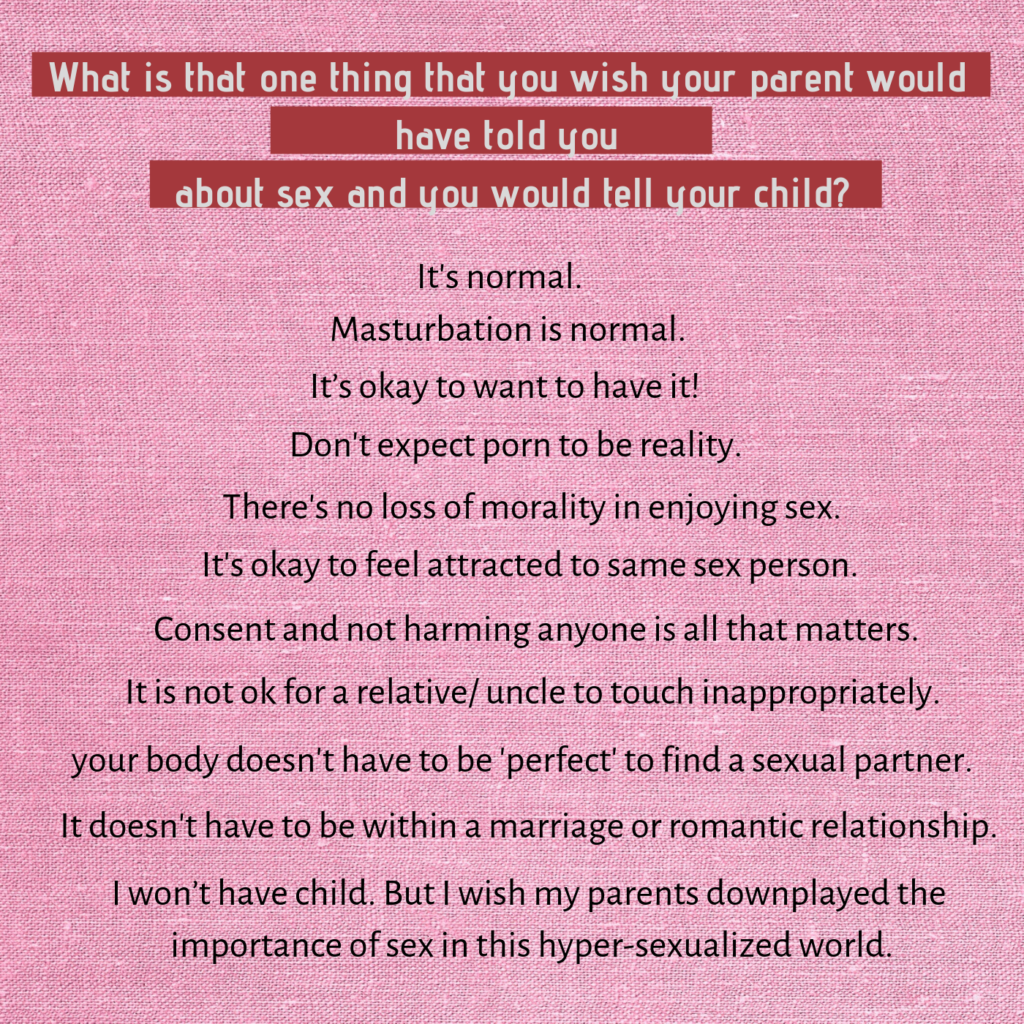Why should we raise Sex-positive kids?

‘I come from a comparatively progressive family. Both my parents were high school teachers and most of their parenting lessons were adopted from the classrooms. As a result I grew up having conversations around safety, sexual abuse, understanding touches and all that with them. At the age of 12, when my classmates were awkwardly calling breasts “tomatoes’’, I knew how silly that was!
I was better informed than my peers. My parents told me that I am the boss of my body and nobody can touch me inappropriately, they told me the names of my private body parts, but what they didn’t tell me was that my body is capable of creating immense pleasure. That discovery was revolutionary against the larger cultural morality.
I was only 15 when I actively started exploring my body and the pleasure it can create. In one of such days when I was playing with myself, ma suddenly entered the room. A chilling sense of embarrassment ran across my spine, leaving me frozen.
We never spoke about that but there was an awkward silence for days. I felt she was disgusted of me. I thought I am a dirty girl.’
-Anonymous, writer, 26, Bangalore.
‘Adolescence is like a mysterious puzzle that can’t be solved no matter how hard you try. At 13, I was struggling to navigate my deeper feelings around romance, attraction and orientation. I was romantically attracted towards girls but wasn’t physically attracted to anyone. When most of my peers were talking about sex, physical intimacy, I felt disconnected. They started bullying me for not being man enough, to an extent that everybody used to laugh at me and call me a freak! I was shamed for not being sexual.
Am I gay?
Am I sexually impotent?
Nobody could answer these questions. The school counsellor helped pacify my anxiety but was unsure of any possible explanation around my struggle for identity.
It was much later that I came across the word ‘Asexual’. While there is a larger discourse that questions the entitlement of labels, I felt that the label helped me to articulate my feelings. I wish I could have had that word for myself a long time ago.’
Abhisekh, Student, 25, Delhi.
Many children go through such experiences, where curiosity intermingles with confusion and shame. In our childhood, we were curious about sex and sexuality just like we were curious about every other thing. And usually it is the parents or other immediate care-givers who are approached for answers and clarity.
But do the caregivers appropriately pacify these curiosities? Or do they knowingly or unknowingly perpetuate a larger culture of shame and stigma? Is our approach to raise children sex-positive?
Sex positivity is basically the idea that all sexual activity, as far as they are healthy and explicitly consensual is a positive thing. It embraces sexuality, sexual identities and practices. We wanted to understand the primary notion of people around sex and sexuality and if at all Indian families are sex positive. To this end, we conducted a small online survey where we received 170 anonymous replies.
To start with we asked what comes in your mind when you hear the word ‘sex’?

The responses did associate pleasure, romance and love with sex there were many replies who considered it forbidden, morally corrupted and taboo.
This needs to be read against the cultural inhibition and silence around sex in India. In recent times, as a reaction to the growing awareness around sexual violence against children, more and more families and institutions have started talking about sex obliquely through the frame work safety and self-protection skills. But most of these conversations center around prevention and not preparation. Such an approach can be misinforming, disempowering, negative and ultimately not in the child’s best interest.
So, why should we raise sex positive children?
- We all are sexual beings.Shaming and stigmatizing sex does more harm to us than good. Children shouldn’t grow up thinking sex is something bad or dirty. They should grow up with age appropriate and correct information around sex, sexual health, healthy sexual behaviors and knowing their sexual-reproductive rights.
- Sex positivity is not about encouraging children to have sex. It is about providing the age-appropriate right information to children about safe sex (use of condom, contraception, STD/STI, pregnancy).
- Sex-positivity embraces sexuality.People experience and identify sexuality in different manner. It’s important to teach children that people with different gender identities and sexual preferences are equally bonafide. We should neither shame people for being sexual nor shame for being asexual or aromatic.
- Sex positivity advocates for making sex education comprehensive.As children, pleasure is among the primary stimuli that we respond to and understand. We cannot teach children sexuality without including pleasure in the discourse.
- Sex positivity is about tolerance and acceptance.It teaches children to be respectful and inclusive of people with different kind of bodies, sexualities and desire.
- Sex-positivity means knowing what you want, and taking self-affirming steps to get it. It helps children to differentiate between desire and abuse.
Parenting or rearing a child doesn’t come with a guidebook. It can be over whelming at times. But the basic trick is to be that one wise, practical and empathetic person that we needed when we were children.
Tell children the things that you wish your parent would have told you about sex and you would tell your child. Here we are sharing some of such sex-positive messages that we received in our survey.








